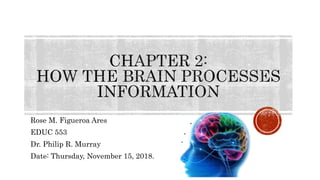
EDUC 553 How the brain processes information
- 1. Rose M. Figueroa Ares EDUC 553 Dr. Philip R. Murray Date: Thursday, November 15, 2018.
- 2. “There are probably more differences in human brains than in any other animal partly because the human brain does most of its developing in the outside world.” Robert Ornstein and Richard Thompson The Amazing Brain
- 3. Scientists are slowly understanding more how the brain processes information with the help of scanning technologies. The brain calls selected areas into play depending on what the individual is doing at the moment. This information allows us to construct models that can explain the data and behavior.
- 4. This model was developed by Robert Stahl of Arizona State University in the early 1980s. Stahl designed a learning taxonomy to promote higher-order thinking skills. It focuses on the major cerebral operations that deal with the collecting, evaluating, storing, and retrieving of information.
- 5. The rapid proliferation of computers has encourage the use of the computer model to explain brain functions. This model uses the analogy of input, processing, and output. Brain Computer Performs slower than a computer Cannot emit a judgment easily Limited capacity Larger storage capacity Open, parallel-processing system Closed linear system Displays emotions Do not display emotions
- 6. Short Term MemoryFive Senses Working Memory Long Term Memory
- 7. The Senses The brain obtains information from the environment through the five senses (external stimuli). All sensory stimuli enters the brain as a stream of electrical impulses. Not all senses contribute equally to our learning. Sensory Register This system includes the thalamus and the reticular activating system (RAS). Function: Filters incoming information to determine how important it is.
- 8. Short-Term Memory It is the storage of information for a limited time. Immediate Memory Sensory data that is not lost moves from the thalamus to the immediate memory. It is a place where we put information briefly until we decide how to dispose it. What is taken into consideration to store or get rid of the information? 1. Personal experiences 2. Threats and emotions 3. Feelings of the learner
- 9. Working Memory Most of the working memory’s activity occurs in the frontal lobes. It is a temporary memory and it is the place where conscious processing occurs. It is seen as a work table: Build, Take Apart and Rework ideas The working memory can handle only a few items at once. This functional capacity changes with age and the type of input. 92170 4915082637
- 10. Working Memory Implications for Teaching Keep the number of items in a lesson objective within the age appropriate capacity limit. Time limits of Working Memory Hermann Ebbinghaus (1850-1909): We can process items carefully in the working memory for up to 45 minutes before becoming fatigued. Peter Russel (1979): Believes this time span is much shorter. Age Attention Span Preadolescents 5 to 10 minutes Adolescents and Adults 10 to 20 minutes
- 11. Criteria for Long-Term Storage Information that has survival value is quickly stored. Strong emotional experiences have a high probability of being permanently stored. Learners ask themselves two questions to determine whether an item is saved or rejected: Does this make sense? Does this have meaning? Sense and meaning are independent of each other. Meaning is more significant.
- 12. Long-Term Storage Storing occurs when the hippocampus encodes information and sends it to one or more long-term storage areas. The encoding process takes times and usually occurs during deep sleep. In the classroom, if the student can accurately recall the learning after approximately 24 hours has passed, we say that learning has been retained.
- 13. The total construct of what is in our long-term memory form the basis of how we see the world. The human brain has the ability to combine individual items in many different ways. Self-Concept: Describes the way we view ourselves in the world. Mindsets Fixed: Success comes from one’s innate ability. Growth: Success comes from one’s efforts and persistence.
- 14. Children in preschool and the primary grades have had relatively few experiences that could cause their emerging self-concept to block learning. Adolescence is a busy time for the brain. Learning Profiles: Includes four elements of how individuals process, remember, and use what they learned: learning styles, intelligence preferences, culture, and gender. Sensory or modality preferences
- 15. Scientists and educators are still investigating how the brain processes information. There are many factors that influence how an individual processes information in the brain. Teachers should deliver meaningful and logical lessons and integrate the students’ experiences in the teaching and learning process.
- 16. Sousa, D. A. (2017). How the Brain Processes Information. In D. A. Sousa, How the Brain Learns (Fifth ed., pp. 43-64). Thousand Oaks,CA: Corwin Press.
Editor's Notes
- Short Term Memory 1. Includes all of the early steps of temporary memory that will lead to stable long-term memory. Immediate Memory It holds data for about 30 seconds. What is taken into consideration to determine the importance of the information? 1.The individual’s experience determine its importance. 2. Threats and emotions affect memory processing. 3. Emotions interact with reason to support or inhibit learning. How a person feels about a teaching or learning experience determines the amount of attention devoted to it.
